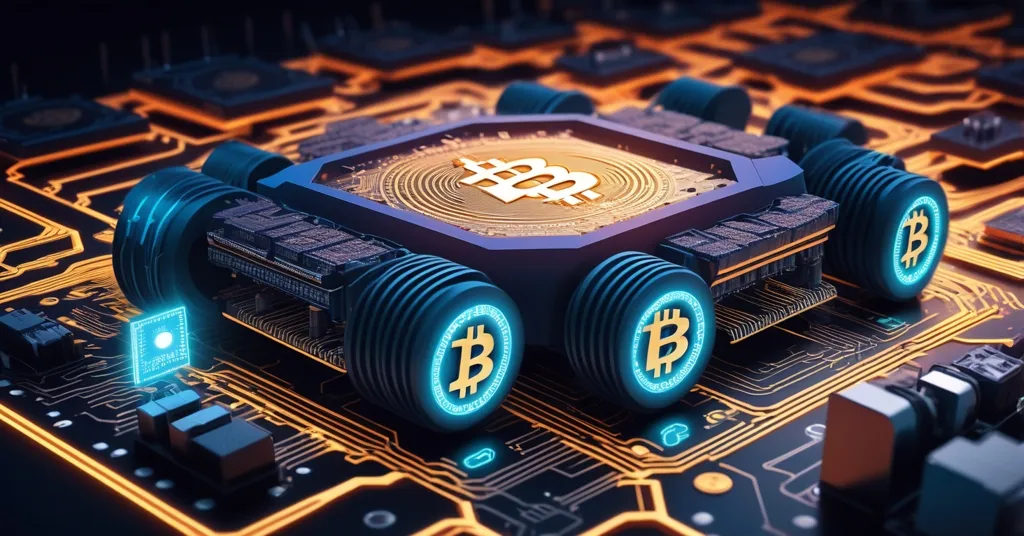Samsung’s $16.5B Tesla Chip Deal: Boost for Tech and Bitcoin Mining Potential

Samsung’s $16.5 Billion Chip Deal with Tesla: A Tech Power Play with Crypto Ripples
Samsung Electronics has struck a monumental $16.5 billion semiconductor deal with Tesla, a move that could reshape the tech landscape and carry significant implications for Bitcoin mining and blockchain innovation. As this South Korean giant claws its way back from financial setbacks, the crypto world watches closely for potential game-changers in hardware efficiency and decentralized systems.
- Deal Overview: $16.5 billion contract to supply chips to Tesla from 2025 to 2033.
- Market Boost: Samsung’s shares surged over 6%, hitting a high not seen since September 2024.
- Crypto Potential: Advanced chips could enhance Bitcoin mining and blockchain applications.
Breaking Down the Samsung-Tesla Partnership
Samsung Electronics, a heavyweight in the global tech arena and the second-largest semiconductor foundry, has secured a staggering $16.5 billion contract with Tesla. Spanning from July 26, 2025, to December 31, 2033, this deal was initially shrouded in secrecy, with Samsung citing the need to protect trade secrets and declining to name the client until the contract’s end. Their regulatory filing even warned investors to tread carefully, noting:
“Since the main contents of the contract have not been disclosed due to the need to maintain business confidentiality, investors are advised to invest carefully, considering the possibility of changes or termination of the contract.”
However, Elon Musk, Tesla’s CEO and perennial headline-grabber, couldn’t resist breaking the silence. Via posts on X, Musk confirmed Tesla as the counterparty and revealed that Samsung’s new Texas fabrication plant, or “fab,” will be dedicated to producing Tesla’s next-generation AI6 chip. He didn’t mince words about the stakes, stating, “The strategic importance of this is hard to overstate,” while hinting at Tesla’s direct involvement in optimizing manufacturing efficiency. This isn’t just a supply agreement; it’s a deep collaboration with far-reaching tech implications, as detailed in recent reports on the partnership.
Samsung’s Struggle and the Road to Recovery
For those unfamiliar, a foundry manufactures chips for companies that don’t have their own production facilities. Samsung holds a 7.7% share of this market as of Q1, down from 8.1%, trailing far behind Taiwan Semiconductor Manufacturing Co. (TSMC), which dominates with a 67.6% slice. Samsung’s recent financials paint a grim picture—a 56% drop in operating income in Q2 to 4.6 trillion won, roughly $3.3 billion, on revenue of about $53 billion. The culprits are inventory write-offs and U.S. trade restrictions on AI chip exports to China, a major market. These policies, aimed at curbing strategic tech advantages, have disrupted global supply chains, hitting Samsung’s bottom line hard.
Yet, this deal with Tesla offers a lifeline. Analysts like Sanjeev Rana from CLSA Securities Korea are optimistic, calling Q2 2025 Samsung’s nadir and forecasting a recovery in the months ahead. The contract is projected to boost Samsung’s foundry revenue by 10% annually, potentially accounting for 8% of their 2024 earnings. Following the announcement, Samsung’s stock soared over 6%, marking its strongest performance since September 2024. It’s a clear signal of investor confidence in this pivotal partnership.
Tech Innovation and U.S. Expansion
Samsung isn’t just banking on this deal for a quick cash infusion; they’re playing the long game with cutting-edge innovation. They’ve developed a prototype for the 2nm Exynos 2600 chip, where “2nm” refers to the tiny size of the chip’s transistors. Smaller transistors mean faster, more powerful, and energy-efficient chips, a critical edge for high-performance tech. Samsung aims for a 50% yield in mass production by 2026, a benchmark for reliability in manufacturing.
Geographically, they’re also making bold moves. Their Texas plant is gearing up for mass production by 2026, a strategic push to capture U.S. clients and mitigate risks from global trade volatility. Musk’s confirmation that this fab will focus on Tesla’s AI6 chip underscores its importance, positioning Samsung as a key player in next-wave technologies like autonomous driving and artificial intelligence. But could these advancements ripple into the crypto sphere? Let’s dig deeper.
Crypto Implications: Mining Efficiency and Beyond
For Bitcoin enthusiasts and blockchain advocates, Samsung’s chip progress is more than just tech trivia—it could be a game-changer. Bitcoin mining relies on specialized hardware called Application-Specific Integrated Circuits, or ASICs, which are custom-built to solve the complex mathematical puzzles that secure the network and earn miners their rewards. Current ASICs are power-hungry beasts, and with Bitcoin’s halving events slashing block rewards every four years, energy costs are a constant thorn in miners’ sides. Samsung’s 2nm tech could lead to ASICs that mine more Bitcoin with less electricity, cutting costs and making mining more accessible, as explored in expert analysis on mining hardware efficiency. If they achieve even a 20-30% efficiency gain, it could reshape profitability models, especially for small-scale miners.
But the potential doesn’t stop at mining. Tesla’s AI6 chip, tailored for advanced applications, opens up speculative but exciting possibilities for blockchain integration. Imagine self-driving cars using blockchain to log tamper-proof data—like mileage, accident records, or even peer-to-peer energy trading for electric vehicle charging—all processed in real-time by high-powered chips. It’s a niche use case, but one that dovetails with the privacy and transparency crypto champions, as discussed in online forums about blockchain applications. Even as a Bitcoin maximalist, I can’t ignore how such innovations might carve out roles for altcoins or protocols like Ethereum in powering decentralized applications for the Internet of Things.
Samsung’s track record adds credibility to these possibilities. They’ve previously supplied chips for mining hardware giants like Bitmain, proving they’re no stranger to the crypto hardware space. If their partnership with Tesla accelerates chip development, we could see indirect benefits trickle down to blockchain scalability, where high-performance nodes are crucial for handling growing transaction volumes, a topic of interest in discussions on blockchain implications. It’s the kind of tech push that aligns with effective accelerationism—racing toward progress, barriers be damned.
The Dark Side: Centralization and Geopolitical Pitfalls
Before we get too starry-eyed, let’s ground ourselves in some harsh realities. Samsung’s reliance on mega-clients like Tesla, while a financial boon, risks further centralizing critical tech infrastructure. If a handful of corporate behemoths control the chips that power everything from Bitcoin mining rigs to AI systems, are we truly disrupting the status quo, or just swapping one set of overlords for another? Handing such power to Silicon Valley giants feels like a gut punch to crypto’s anti-establishment roots. The community should be pushing for open-source chip designs or decentralized manufacturing solutions to keep the ethos of freedom alive, a concern echoed in community discussions on tech impacts.
Geopolitical turbulence adds another layer of risk. U.S.-China trade tensions, amplified by erratic policies in recent years, have already battered Samsung with export curbs on advanced AI chips. While recent relaxations on some shipments to China offer a sliver of hope, cutting-edge tech remains locked down, and policy flip-flops are a persistent threat. Analyst Peter Clarke from TechSplicit nailed it when he warned of “expediency over principle” in these trade games. Add to that Tesla’s history of overpromising on timelines—remember Musk’s lofty autonomous driving deadlines?—and potential delays in Samsung’s 2nm rollout, and you’ve got a recipe for uncertainty. For crypto miners banking on next-gen hardware, these hiccups could sting.
Then there’s the broader question of supply chain resilience. The U.S. CHIPS Act is pushing for domestic manufacturing, which benefits Samsung’s Texas expansion, but it also concentrates power in American corporate hands. If trade wars escalate or new restrictions emerge, the availability and cost of mining hardware could take a hit, directly impacting Bitcoin’s decentralized network. We’re rooting for innovation, but we can’t ignore these red flags waving in the wind. For more background on Samsung’s role in the industry, check out their comprehensive tech profile.
What’s Next for Samsung and Crypto?
Looking ahead, Samsung’s trajectory could take intriguing turns for the crypto space. Might they pivot directly into the mining hardware market, partnering with firms like Bitmain again or even new players? Could their chips enable breakthroughs in blockchain-based AI for decentralized finance or data privacy tools? While Bitcoin remains king in my book, I’m pragmatic enough to see how Ethereum or other protocols might leverage such tech for scalable dApps—decentralized applications—that challenge centralized tech giants.
Still, the balance of optimism and caution is key. Samsung’s deal with Tesla is a testament to tech’s relentless march forward, potentially fueling Bitcoin adoption through better hardware and bolstering decentralized systems. Yet, the specter of centralization and geopolitical chaos looms large. Are we building a freer future with these chips, or just crafting shinier cages for Big Tech to trap us in? That’s the million-Bitcoin question.
Key Takeaways and Questions for Crypto Enthusiasts
- What’s the big deal about Samsung’s $16.5 billion contract with Tesla?
It’s a massive boost for Samsung’s foundry business, projecting a 10% annual revenue increase and strengthening their role in AI and automotive tech with Tesla’s AI6 chip. - How could Samsung’s chip tech impact Bitcoin mining?
Their 2nm advancements could create more efficient ASICs, slashing energy costs for miners and enhancing profitability, especially post-halving. - Is there a blockchain angle to Tesla’s AI chip plans?
Potentially, as AI chips could enable decentralized data systems in self-driving cars, using blockchain for secure, private logging of driving data without middlemen. - Does Samsung’s reliance on Tesla pose risks to crypto’s decentralized ethos?
Yes, concentrating chip supply with corporate giants could create new gatekeepers, clashing with crypto’s mission to dismantle centralized control. - Could geopolitical issues derail Samsung’s plans and affect crypto hardware?
Absolutely, U.S.-China trade volatility and policy shifts could disrupt chip production, hiking costs or limiting availability of mining hardware for Bitcoin enthusiasts.



